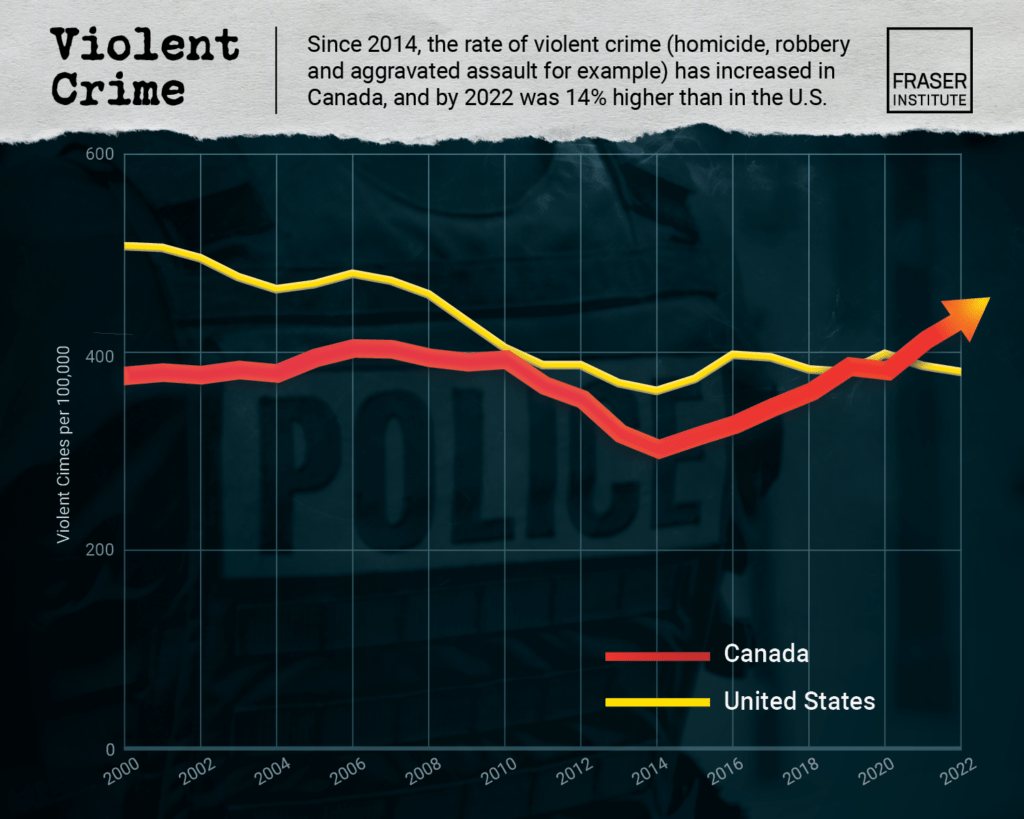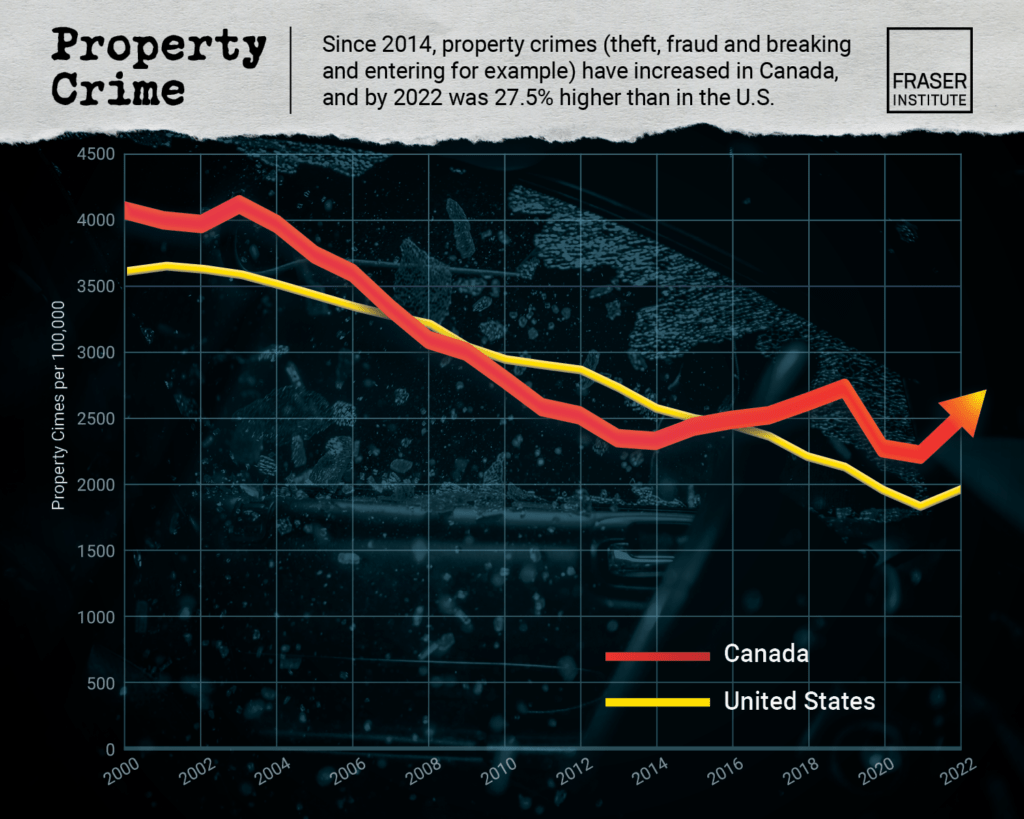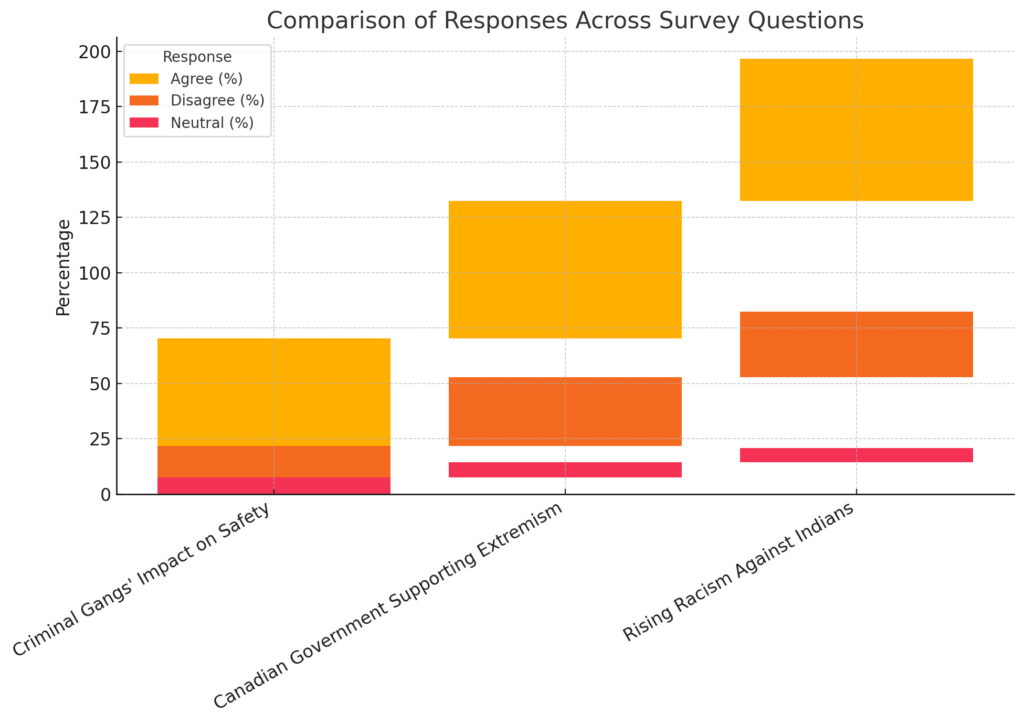AI Generated Summary
- With over 3,200 respondents weighing in on topics ranging from the presence of extremist gangs to governmental policies and racial discrimination, the findings reveal a tapestry of anxieties that demand immediate attention.
- Equally concerning is the perception that the Canadian government is either complicit in or indifferent to extremist activities.
- Perhaps the most distressing finding is the perception of rising hatred and racism against Indians in Canada.
Recent surveys have illuminated a concerning trend: growing unease among the Indian community in Canada over safety, governmental accountability, and rising racial tensions. With over 3,200 respondents weighing in on topics ranging from the presence of extremist gangs to governmental policies and racial discrimination, the findings reveal a tapestry of anxieties that demand immediate attention.
At the heart of these concerns is the perception of safety—or lack thereof. When asked whether the presence of criminal and extremist gangs has made Canada a less safe destination for Indians, an overwhelming 70.35% of respondents agreed or strongly agreed. This stark majority highlights fears that organized criminal groups and extremist factions are creating an unsafe environment. Notably, a smaller, but still significant, portion (21.75%) disagreed, suggesting that experiences within the community vary widely.

Safety in the Crosshairs
Canada has long been seen as a haven of multiculturalism, but these findings challenge that narrative. The growing perception of gang-related violence, particularly targeting immigrant communities, signals a deeper issue. Many respondents pointed to high-profile incidents involving gang violence and extremist rhetoric as reasons for their apprehension. In contrast, those who disagreed emphasized that safety risks are often localized or exaggerated by media portrayals. This division underscores the complexity of addressing such fears, as perceptions are shaped by both personal experiences and external influences.

What becomes clear from this data is the pressing need for stronger initiatives to combat gang violence and extremist activities. Increased collaboration between law enforcement, community leaders, and immigrant organizations could pave the way for targeted interventions that address these safety concerns.

Governmental Accountability Under Scrutiny
Equally concerning is the perception that the Canadian government is either complicit in or indifferent to extremist activities. A striking 62.1% of respondents believed that the government directly or indirectly supports such activities. For many, this perception stems from frustration over perceived inaction or insufficient measures to curb the influence of extremist groups. This sentiment is exacerbated by incidents where political leaders have been accused of pandering to divisive elements for electoral gain.

Conversely, 31.1% of respondents rejected the idea of government complicity, asserting that the government actively opposes extremism. This divide reflects the polarized nature of public discourse surrounding the government’s role. While some laud Canada’s policies promoting inclusivity and diversity, others argue that these measures have not gone far enough to dismantle systemic issues.
To rebuild trust, the Canadian government must take proactive steps. Clearer communication, coupled with tangible actions against extremist groups, is essential. Policies that prioritize community safety and actively promote integration could alleviate fears and foster a greater sense of belonging.
Rising Racism: An Alarming Trend
Perhaps the most distressing finding is the perception of rising hatred and racism against Indians in Canada. Over 64% of respondents agreed or strongly agreed that racial discrimination is on the rise. This sentiment resonates with broader concerns about hate crimes and intercommunity tensions, which have been exacerbated by global events and inflammatory rhetoric.

These fears are not unfounded. Reports of hate crimes against South Asians have risen in recent years, fueled by misinformation and political polarization. The experiences of the Indian diaspora, however, are not uniform. Nearly 30% of respondents disagreed with the notion of rising racism, suggesting that some individuals feel insulated from these issues or view them as isolated incidents rather than systemic problems.
Regardless of differing perspectives, the impact of racism on community cohesion cannot be understated. Efforts to combat racial discrimination must go beyond surface-level initiatives. Comprehensive educational campaigns, robust anti-discrimination laws, and platforms for intercultural dialogue are critical to addressing the root causes of prejudice.
A Call to Action
The findings of these surveys paint a sobering picture. Safety concerns, government accountability, and rising racism are interwoven issues that affect not only the Indian community but also the broader fabric of Canadian society. While Canada’s reputation as a welcoming and inclusive nation remains intact for many, these challenges threaten to erode that image.
Addressing these concerns requires a multi-pronged approach. Law enforcement must be empowered to tackle gang violence and extremist activities with precision and empathy. The government must adopt transparent policies that prioritize the safety of all communities while holding extremists accountable. Finally, fostering a culture of inclusivity will require sustained efforts from educational institutions, community leaders, and individuals.
For the Indian diaspora in Canada, these surveys are more than statistics; they are a reflection of lived experiences, hopes, and fears. As global attention increasingly focuses on the challenges faced by immigrant communities, Canada has an opportunity to lead by example. By acknowledging these concerns and taking decisive action, the country can reaffirm its commitment to diversity, safety, and justice for all.
The voices of the survey respondents are a clarion call for change. They demand that we confront uncomfortable truths and work toward solutions that bridge divides and foster understanding. Canada has the tools and the values to address these issues. What remains to be seen is whether it has the will to act decisively. For the Indian community, and for all Canadians, the stakes could not be higher.




